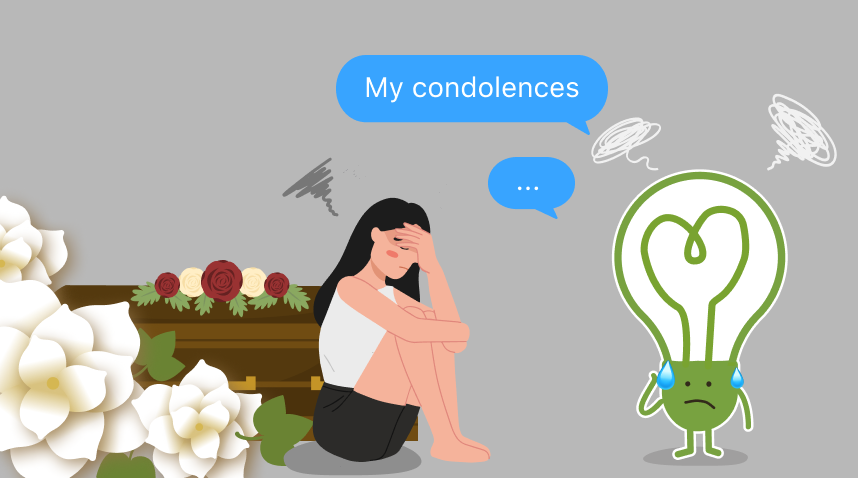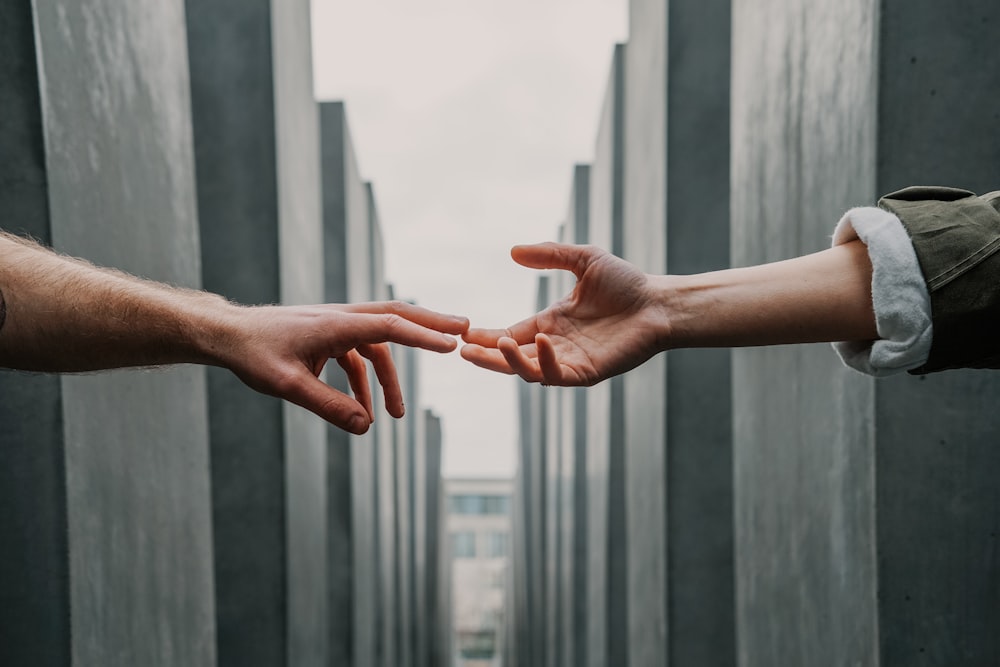
Finding Strength in Sorrow: Coping with Grief through the Four Immeasurables
TLDR: Grief is a challenging process, especially after the death of a loved one. But we can draw inspiration from the teachings of the Buddha, especially about the Four Immeasurables—the cultivation of loving-kindness, compassion, appreciative joy, and equanimity—to work through difficult emotions, counter cognitive distortions, and develop a deeper relationship with our grief over the long term.
View outside the hospital room—there’s always light at the end of the tunnel (September 2023)
When was the last time you talked honestly and openly about grief and death? For many, coping with the death of a loved one can be difficult and painful. In the Singaporean or Asian context, death is often also regarded as taboo, spoken about only in hushed tones, and consigned to the corners of our lives.
Often, we just can’t, or don’t know how to, or simply don’t wish to confront it, because it’s just too unpleasant to contemplate.
But it’s precisely because grief and death are hard to talk about, that we need to offer it our deep attention and understanding. In the Upajjhatthana Sutta (AN 5.57), the Buddha describes the Five Remembrances, which are recommended for frequent recollection. These facts of life include the truth that we cannot avoid death, and one day we will be separated and parted from all that is dear and beloved to us.
My personal experience of such loss was my father’s struggle with cancer and subsequent passing. In May last year, he collapsed suddenly at home, and had to be rushed by ambulance to hospital.

At the time, his condition was still unknown, so multiple tests had to be conducted on him while he was still in the high-dependency ward. It was only months later, in August, that he was diagnosed with end-stage bile duct cancer, and it was more severe than anticipated. The doctors estimated that he had only around four weeks left to live (and they would turn out to be right – he had five weeks).
Those final few weeks of my father’s life were a difficult time for me and my family, especially my mother and sister. Every day involved a routine of shuttling between our workplaces, hospital, and home, as hospital visits became a regular part of our lives, and we would take turns to keep my father company. Amidst the sterile smell of antiseptic solution and the periodic beeping of the machines, the constant hum of activity was overwhelming.
I remember navigating a complex web of emotions. Guilt weighed heavily on me during those days spent by his side. I often questioned myself whether I had done enough, and if I could have done more as a son.

I thought about all the times when my Dad suggested going for overseas trips as a family, like to the Great Wall in Beijing—but I always said I could never find the time. The painful reality was that I had prioritised other aspects of life, like my work, above family time.
Now it would be too late. I’m reminded about how it’s been said that the four saddest words in the English language are “it could have been”.
But instead of wallowing in guilt and despair, what if we viewed death and grief as valuable opportunities for deeper reflection and personal transformation? After all, over the last few weeks of my father’s life, my family and I had some of our deepest conversations with him—about his memories, our family history, and about the meaning of life and death itself. Amidst the darkness, glimmers of light can still shine through—even in the face of loss, there is still room for shared connection and precious moments of joy.
One way of understanding death and grief is through the Four Immeasurables, or Brahmavihārās. Described by the late Buddhist teacher Ayya Khema as “the only emotions worth having”, the Four Immeasurables offer us a helpful framework to practise developing positive mind states and avoid negative ones.
By cultivating the Four Immeasurables, we can emulate the mind states of enlightened beings, while sowing the seeds of limitless (and hence ‘immeasurable’) goodwill towards ourselves and others.
Metta: Loving-Kindness
The word ‘loving-kindness’ is interesting. The first half is ‘loving’—and as the late Queen Elizabeth II famously said, grief is the price we pay for love.
In other words, grief is the natural extension of love, because they are inherently intertwined. Grief reveals itself in the corridors of the pathways we once walked together with our deceased loved ones, in the empty spaces of rooms where they once lived and laughed, and even in the scent of their belongings—like the old books that my father once owned.
Since love entails grief, should we just love less, or even give up on love? Clearly, that’s a misconception, or what psychology would refer to as a cognitive distortion.
The second half of the word ‘loving-kindness’ holds the clue as to why. The key lies in how we love—when we dwell less on our attachment to our loved ones, we can devote more attention to answering their needs more effectively, and express a deeper level of kindness towards them. The practice of metta itself can inspire such kindness and generosity. As the writer Leo Tolstoy put it, “Kindness enriches our life; with kindness, mysterious things become clear, difficult things become easy, and dull things become cheerful.”
We can show metta to our loved ones in simple ways, even just by spending quality time with them. For instance, I would ask Dad during my visits what he would like to eat, but he had no appetite, and often he felt nauseous.
He also mentioned he felt cold at night so I brought him a quilt with a sign reading “My Dad”, even though the hospital provided plenty of blankets. To keep my father focused on positive thoughts, my sister and I asked him about his childhood memories, his life as a teacher, his growing-up years, how he met our mother, and what it was like bringing us up.
Every day felt like Tuesdays with Morrie, the 1997 memoir by Mitch Albom about his visits to his terminally ill former college professor. As the poet Philip Larkin once put it: “We should be kind / While there is still time.”
Just as Dad used to recite lines of poetry to me as a child, so I read and recited poems to him at his bedside as well, such as the poem ‘Invictus’—which is about resilience in the face of adversity. I also shared stories from the newspapers with him.
At the time, the Singapore presidential elections were ongoing, so I would update him about it too. With my dad, I learnt the value of cherishing every moment with loving-kindness.
Karuna: Compassion
Another valuable mind-state is karuna, or compassion. It’s not about feeling sorry for our loved ones, but about feeling with them, and journeying alongside them for as long as we can.

This journey can be difficult, which entails recognising suffering as an inevitable part of life, and often also fosters a deeper sense of compassion towards others who are also suffering or grieving. We are not alone in our pain.
My dad’s struggle with terminal cancer was undoubtedly painful. Each day, as I pored through the lists displayed by the hospital staff describing pumps, tubes, vials, injections, pills, and wipes, I couldn’t help but think about mortality, vulnerability, and frailty — in the end, it all came down to this.
It was the first Noble Truth staring at me in the face. The fear and uncertainty that accompanied such terminal illness were paralysing. Every morning, I would wonder whether the doctors would bring worse news, or if that very day might be my dad’s last.
Dying people also sometimes make strange sounds—in my father’s case, especially towards the last few days, it was a kind of dry gasping and rasping. I remember one particular night when the pain from the cancer was particularly unbearable, and his face would be contorted with grimaces of pain.
Witnessing someone you love endure such physical suffering is heart-wrenching, to say the least, and it leaves an indelible mark of sorrow.
But this is when the Dharma provides the timeliest of medicines. By acknowledging suffering rather than pushing it away, we can discover a wellspring of strength within ourselves. After the hospital administered painkillers for my father each day, my family and I would also chant at his bedside, including the name of Amitabha Buddha (Namo Amituofo), mantras (like om mani padme hum), and the Heart Sutra (Xin Jing, also known as the Prajna Paramita Hridaya Sutra). As we dedicated the merits of such recitations to him, he would noticeably breathe more easily and sleep more peacefully.
As a friend advised—and as medical professionals also affirm—the sense of touch is usually one of the last faculties to go. As my father drifted off to sleep each evening, I would often hold his hand, providing not just physical but also emotional and spiritual warmth.
A loving touch, fuelled by tenderness, offers not just a sense of connection but also serves as a balm from pain.
Besides showing compassion towards our loved ones and others, we mustn’t forget to be compassionate to ourselves too. Caregiver burnout is a real danger, and it’s crucial to remember that while we may feel consumed by grief, we must also prioritise our own well-being.
The Buddhist teacher Mushim Patricia Ikeda has formulated a “Great Vow for Mindful Activists”: “I promise, for the benefit of all, to practice self-care, mindfulness, healing, and joy. I vow to not burn out.” Taking time for ourselves is not selfish but necessary for healing. Whether it’s seeking support from friends and family, or engaging in activities that bring us joy, self-care allows us to replenish our energy and find solace amidst sorrow.
Mudita: Appreciative Joy
Losing a loved one is a painful experience. Losing a parent, in particular, brings an added dimension of loss: their departure represents the closing of a chapter in our lives. Parents are usually the source of guidance and support for us—their presence symbolises a sense of stability, security, and belonging.
With their passing, we may feel lost, unmoored, and unanchored, with all the childhood memories and family traditions associated with them also threatened by loss.
But what if we transformed this mindset of feeling fearful and threatened into a more positive mind state of being grateful and appreciative? Mudita, or appreciative joy, reminds us that we can choose to focus not on fear or regret but rather on existing opportunities for gratitude.

I’m reminded of Ajahn Brahm’s oft-shared story in Opening the Door of Your Heart about how a life is like a musical concert—we should applaud at the end rather than grieving that it has concluded.
In the case of my father, I was deeply inspired by his sheer emotional strength. Despite everything he went through—treatments, operations, and long hospital stays—he never allowed himself to become consumed by despair.
He demonstrated what true grit looks like, and he imparted valuable lessons about finding strength within ourselves during life’s most challenging moments.
Devoting time to cultivate appreciative joy can be deeply cathartic. On the afternoon of my father’s passing, my family and I had a “Showers of Love” ceremony, during which we had the opportunity to clean and dress my Dad’s body for the last time. It was like a sacrament and a blessing—a final act of service to convey our gratitude to him, and bid him farewell.
Together with my mother and sister, we helped my Dad to put on his favourite suit before we laid him in the casket.
As I said in my eulogy for him at the crematorium, it’s just like the words of Shakespeare—“the wheel is come full circle”. The whole service was personal, heartfelt, and deeply meaningful.
Dad also specifically said to thank the medical team at National University Hospital who supported us closely over those final few months. That’s exactly what my family and I did: we personally delivered appreciation cards and a gift basket to the hospital staff.
Writing a long appreciation email to them was also a way to pay tribute to their dedication and support. In addition, we put up a five-star Google review for the funeral company (The Life Celebrant), as they bestowed a meaningful and dignified farewell for my father. Such gestures not only honoured my Dad’s wishes, but also cultivated appreciative joy for all who helped to support him during the challenging period of his final days.
Upekkha: Equanimity
Grief and death can offer valuable lessons about the nature of life itself. Developing upekkha, or equanimity, can help us to find peace and cultivate gratitude for the present moment. My father’s experience showed me that accepting impermanence doesn’t mean giving up hope or resigning oneself to despair.
Rather, it means acknowledging reality while still nurturing a firm optimism and resilience that can inspire others.
By embracing impermanence, we can cultivate a deeper appreciation for the preciousness of life, especially of a life in which we have the opportunity to encounter the Dharma. We learn to cherish every interaction, every smile shared with our loved ones, and the beauty of every fleeting moment, precisely because we understand that “all conditioned phenomena are impermanent” (Dhammapada, verse 277).
I’m reminded of a talk, years ago when I was an undergraduate, given by a medical doctor who was a featured speaker during the Dharma Camp organised by the National University of Singapore (NUS) Buddhist Society.
As he observed, when we die, we usually don’t die all at once—instead, we die in bits and pieces. The eyes or other faculties might first weaken, and then the major organs go one by one, until finally, it’s the heart or lungs that cease to function, and then breathing itself gives way.
The piecemeal nature of the dying process prompts the question: where is the self? However hard we might try to locate or isolate this aspect of ‘me’ or ‘mine’, we find that the self ultimately dissolves.
There’s no solid or stable self that can persist or endure no matter how hard we attempt to grasp it.
Similarly, the Soto Zen priest Tenku Ruff describes grief not as a thing in itself but as a process or continuum that unfolds at a pace of its own. There is no single right way to grieve. We can give ourselves permission to experience our grief without judgment or self-criticism.
Based on our respective situations, we can find out for ourselves what works best, such that we can hold space for healing and honour the memory of our loved ones.
Rituals can be particularly helpful to cope with grief. In the Chinese Buddhist tradition that my family and I practise, we chanted sutras and mantras, and dedicated merits to my father every seven days, starting from the day of his passing.
We also commemorated the 100th day since his death, which happened to fall exactly on 1 January this year. It was a touching tribute that allowed me and the family to process our own emotions while paying homage to my Dad’s legacy.
As the palliative care physician Ira Byock suggested in Dying Well, the suffering of dying can be alleviated through deathbed rituals that are designed to promote forgiveness. The dying can be encouraged to engage in the following five steps, summarised as: “Forgive me. I forgive you. Thank you. I love you. And goodbye.”
Imagine if we don’t have to be on our deathbeds before we engage in such rituals. What the Dharma teaches us is how to attend to our grief, just as we can be mindful of our breath during sitting meditation. Instead of resisting our feelings, we can pay attention to our sorrow, loneliness, and the whole myriad of complex human emotions that arise from the experience of loss. We can observe these feelings with kindness and wisdom, before we open our hearts, and let them go.
I’m sure my Dad would have approved.
Wise Steps:
- Treasure precious opportunities to connect with our loved ones while they are still around, especially by spending quality time with them.
- Engage in meaningful rituals with the right intention, whether in terms of deathbed rituals that promote forgiveness, or chanting practices that can help to dedicate merits to our departed loved ones.
- Practise mindfulness, including of our own grief, and seek support from friends or family who can provide support and guidance when navigating through difficult emotions.
Helpful Resources
- Peaceful Death, Joyful Rebirth: A Tibetan Buddhist Guidebook (2006) by Tulku Thondup
- The Year of Magical Thinking (2007) by Joan Didion
- The Grief Recovery Handbook, 20th Anniversary Expanded Edition: The Action Program for Moving Beyond Death, Divorce, and Other Losses including Health, Career, and Faith (2017), by John W. James and Russell Friedman
- Option B: Facing Adversity, Building Resilience, and Finding Joy (2017) by Sheryl Sandberg and Adam Grant
- Loss Adjustment (2019) by Linda Collins
- HealthHub: Coping with Bereavement for Better Mental Wellness
- Agency for Integrated Care: Managing Emotions
References
Albom, M. (1997). Tuesdays with Morrie: An Old Man, a Young Man, and Life’s Greatest Lesson. Doubleday.
Brahm, A. (2009). Opening the Door of Your Heart: And Other Buddhist Tales of Happiness. Hachette Australia.
Byock, I. (1997). Dying Well: Peace and Possibilities at the End of Life. Riverhead Books.
Ikeda, M. P. (2023, November 20). I Vow Not to Burn Out. Lion’s Roar. Retrieved from https://www.lionsroar.com/i-vow-not-to-burn-out
Larkin, P. (2001). The Mower. Collected Poems. Farrar Straus and Giroux.
Lion’s Roar Staff. (2019, November 19). What Are the Four Brahmaviharas? Lion’s Roar. Retrieved from https://www.lionsroar.com/what-are-the-four-brahmaviharas
Popova, M. (2019, July 21). Leo Tolstoy on Kindness and the Measure of Love. The Marginalian. Retrieved from https://www.themarginalian.org/2019/07/21/leo-tolstoy-kindness-calendar-of-wisdom
Wade, B.; Ruff, T., & Damchö, D.F. (2021, October 1). Ask the Teachers: How Can the Dharma Help Us to Work Through Grief? Lion’s Roar. Retrieved from https://www.lionsroar.com/ask-the-teachers-how-can-the-dharma-help-us-to-work-through-grief






